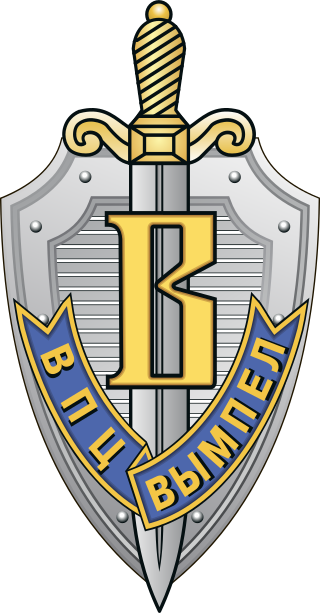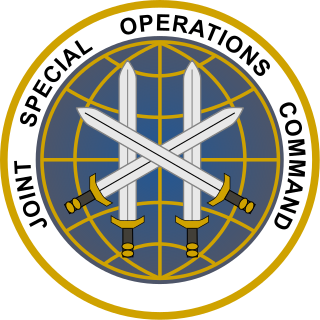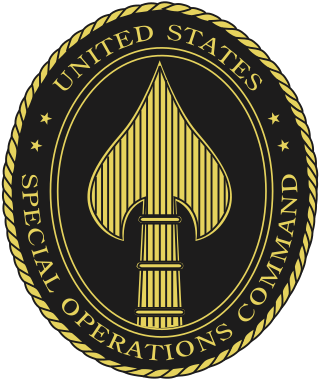
India has several Special Forces (SF) units, with the branches of the Indian Armed Forces having their own separate special forces units. The Indian Army has the Para SF, the Indian Navy has the MARCOS, and the Indian Air Force has the Garud Commando Force. There are other special forces which are not controlled by the military, but operate under civilian organisations, such as the National Security Guard under Home Ministry and Special Group under RAW. Small groups from the military SF units are deputed in the Armed Forces Special Operations Division, a unified command and control structure.
Waziristan is a mountainous region covering the North Waziristan and South Waziristan districts of the Pakistani province of Khyber Pakhtunkhwa. Waziristan covers around 11,585 square kilometres (4,500 sq mi) and is mainly populated by the Wazir Pashtun tribe, who speak the Waziri dialect of the Pashto language.

The Special Activities Center (SAC) is a division of the United States Central Intelligence Agency responsible for covert and paramilitary operations. The unit was named Special Activities Division (SAD) prior to 2015. Within SAC there are two separate groups: SAC/SOG for tactical paramilitary operations and SAC/PAG for covert political action.

Directorate "V" of the FSB Special Purpose Center, often referred to as Spetsgruppa "V"Vympel, but also known as KGB Directorate "V", Vega Group, is an elite Russian special forces unit, under the command of the FSB.

Jungle warfare or woodland warfare is warfare in forests, jungles, or similar environments. The term encompasses military operations affected by the terrain, climate, vegetation, and wildlife of densely-wooded areas, as well as the strategies and tactics used by military forces in these situations and environments.

The Inter-Services Intelligence is the largest and best-known component of the Pakistani intelligence community. It is responsible for gathering, processing, and analyzing any information from around the world that is deemed relevant to Pakistan's national security. The ISI reports to its director-general and is primarily focused on providing intelligence to the Pakistani government.

The Joint Special Operations Command (JSOC) is a joint component command of the United States Special Operations Command (USSOCOM) and is charged with studying special operations requirements and techniques to ensure interoperability and equipment standardization, to plan and conduct special operations exercises and training, to develop joint special operations tactics, and to execute special operations missions worldwide. It was established in 1980 on recommendation of Colonel Charlie Beckwith, in the aftermath of the failure of Operation Eagle Claw. It is headquartered at Pope Field.
Mīrānshāh (Pashto: میران شاه) is a small town that is the administrative headquarters of North Waziristan District, Khyber Pakhtunkhwa province of Pakistan. Miranshah lies on the banks of the Tochi River in a wide valley surrounded by the foothills of the Hindu Kush mountains. It is located at an elevation of about 930 metres (3,050 ft), 17 kilometres (11 mi) from the Pakistan-Afghanistan border. The nearest city in Pakistan is Bannu, about 55 kilometres (34 mi) to the east, while the nearest city across the border in Afghanistan is Khost, 60 kilometres (37 mi) to the northwest.

Haji Mirzali Khan Wazir, commonly known as the Faqir of Ipi, was a tribal chief and adversary to the British Raj from North Waziristan in what is now Khyber Pakhtunkhwa, Pakistan.

The Special Actions Detachment or DAE is the tier one special force maritime unit of the Portuguese Navy. It is part of the Portuguese Marine Corps. Raised in 1985, the DAE is one of the smallest special forces units within the Portuguese Armed Forces. It is responsible for conducting air-sea rescue, amphibious reconnaissance, amphibious warfare, black operation, bomb disposal, CBRN defense, coastal raiding, counterterrorism, direct action, executive protection, hostage rescue, irregular warfare, ISTAR, long-range penetration, JTAC, manhunt high-value target, maritime sabotage, mountain rescue, naval boarding, operation behind high risk enemy lines, special operations, special reconnaissance, tracking targets, underwater demolition, unconventional warfare, other missions in support of Portuguese and NATO armed forces. DAE's mission and training are similar to American special forces and it often trains with them.

Operation Cyclone was the code name for the United States Central Intelligence Agency (CIA) program to arm and finance the Afghan mujahideen in Afghanistan from 1979 to 1992, prior to and during the military intervention by the USSR in support of the Democratic Republic of Afghanistan. The mujahideen were also supported by Britain's MI6, who conducted their own separate covert actions. The program leaned heavily towards supporting militant Islamic groups, including groups with jihadist ties, that were favored by the regime of Muhammad Zia-ul-Haq in neighboring Pakistan, rather than other, less ideological Afghan resistance groups that had also been fighting the Soviet-oriented Democratic Republic of Afghanistan administration since before the Soviet intervention.

The Pakistan Air Force Special Services Wing is a special operations force who specialised in all aspects of air-to-ground communication, including air traffic control, fire support, command, control and communications in covert counterterrorism or austere environments. Their functionality is similar to American Air Combat Control Team of the United States Air Force. They are often assigned individually or as a team to Army Special Service Group, Navy Special Service Group, Pakistan Rangers and special tactics units of the Pakistan Marines, to provide expert airfield seizure, airstrike control and communications capabilities.

Several sources have alleged that the Central Intelligence Agency (CIA) had ties with Osama bin Laden's faction of "Afghan Arab" fighters when it armed Mujahideen groups to fight the Soviet Union during the Soviet–Afghan War.
In United States military doctrine, unconventional warfare is one of the core activities of irregular warfare. Unconventional warfare is essentially support provided by the military to a foreign insurgency or resistance. The legal definition of UW is:
Unconventional Warfare consists of activities conducted to enable a resistance movement or insurgency to coerce, disrupt or overthrow an occupying power or government by operating through or with an underground, auxiliary or guerrilla force in a denied area.

COBRA is a special operation unit of the Central Reserve Police Force (CRPF) of India proficient in guerrilla tactics and jungle warfare. Originally established to counter the Naxalite movement, CoBRA is deployed to address insurgent groups engaging in asymmetrical warfare. Numbering ten battalions as of 2011, CoBRA is considered to be one of the most experienced and successful law enforcement units in the country.

The Pakistan Army Special Service Group is the special operations forces of the Pakistan Army. They are also known by their nickname of "Maroon Berets" due to their headgear.

The United States Special Operations Command is the unified combatant command charged with overseeing the various special operations component commands of the Army, Marine Corps, Navy, and Air Force of the United States Armed Forces. The command is part of the Department of Defense and is the only unified combatant command created by an Act of Congress. USSOCOM is headquartered at MacDill Air Force Base in Tampa, Florida.

Charlie Wilson's War: The Extraordinary Story of the Largest Covert Operation in History is a 2003 book by George Crile III. Upon publication, the book received praise from The New York Times, making it onto their best seller list. The book was also placed on Washington Post and Los Angeles Times best seller lists.
Gūrwēk is a town in North Waziristan in the Federally Administered Tribal Areas of Pakistan, on the border with Afghanistan. Gurwek is located about 46 km (29 mi) southwest of Miramshah, the capital of North Waziristan.

Though not officially a belligerent during the Soviet–Afghan War, the United Kingdom was heavily involved, playing a key covert role in the conflict. Also known as the Second Great Game, the British provided both indirect and direct support for the Afghan mujahideen in their fight against the Soviet Union, including secretly arming, funding and supplying various factions. Britain's Secret Intelligence Service (MI6) primarily supported the Mujahideen group Jamiat-e Islami, commanded by Ahmad Shah Massoud who, having received little support from the US and Pakistan, became Britain's key ally in the conflict. Fighting in the Panjshir valley, Massoud and his fighters with British support and intelligence, overcame nine Soviet offensives and held out up to the Soviet withdrawal from the vital valley in 1986. Massoud became the most successful and feared out of any of the Mujahideen commanders.
















